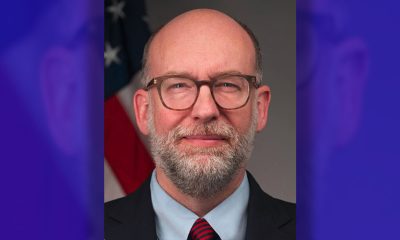
Supporters participate in a during a demonstration for Tony Robinson along Williamson Street in Madison, Wis., Wednesday, May 13, 2015. (John Hart/Wisconsin State Journal via AP)
Todd Richmond, ASSOCIATED PRESS
MADISON, Wis. (AP) — When a white police officer killed an unarmed biracial teen in Wisconsin’s capital city, the shooting quickly heightened tensions and stirred up protests.
But no one has hurled so much as a pebble, broken anything or thrown any punches in protests since Officer Matt Kenney shot 19-year-old Tony Robinson in March in a home near the Capitol building. The approximately two dozen arrests so far have involved protesters blocking traffic.
Instead, police-community relationships, demographics, traditions and cooler heads helped keep Madison’s streets peaceful — at least so far.
“I think the people in this city are … pretty good about voicing their emotions without running around and tearing things up,” said Andrea Irwin, Robinson’s mother. “I don’t think that’s ever happened in Madison.”
Dane County District Attorney Ismael Ozanne raised the ante Tuesday when he announced he would not charge Kenny in Robinson’s death, saying the officer’s actions were justified because Robinson, who was high on hallucinogenic mushrooms, punched Kenny in the head.
The Young, Gifted and Black Coalition, an activist group that has been organizing the protests, led about 200 people on a march through the city’s downtown Wednesday. During a mock trial on the Dane County Courthouse steps, they found Kenny guilty of homicide and then sat in the street before finally dispersing. About two dozen people were taken away in handcuffs after they refused to clear the road, and almost all were released with a $124 misdemeanor fine.
Madison is unlikely to explode like Ferguson, Missouri, or Baltimore, which saw riots break out over police-related killings, said Carl Taylor, a Michigan State University sociology professor who has researched youth culture and violence. Madison doesn’t suffer from high unemployment and other large-scale social problems that can exacerbate civil unrest, Taylor said.
African-Americans make up only about 7 percent of the population in Madison, compared with more than 60 percent in both Ferguson and Baltimore. Police here say they have tried to build trust in the community, meeting with minority leaders and putting officers through diversity training.
Protests have become a regular part of Madison life, too. The city, known as one of the nation’s most liberal, saw tens of thousands of people converge on the state Capitol for three straight weeks in 2011 to rally against Republican Gov. Scott Walker’s plan to strip public workers of their union rights. Passions rode much higher over that issue than in Robinson’s death, and everyone stayed peaceful.
Still, Police Chief Mike Koval began working to avoid what he called Ferguson’s “missteps” in the first hours following the shooting.
Ferguson police initially gave little information about the death of Michael Brown and took a week to identify the officer who shot him. They released video the same day showing what they said was Brown robbing a store.
Koval, in contrast, rushed to Robinson’s mother’s home to offer his condolences hours after the shooting and prayed with his grandmother. He identified Kenny the day after Robinson’s death.
He also volunteered that Kenny had killed a man in the line of duty in 2007 and had been cleared of any wrongdoing. He declined to discuss Robinson’s armed robbery conviction last year, saying commenting on his past would be inappropriate.
Ozanne prefaced his announcement Tuesday with condolences to Robinson’s family. He pointed out that he himself is biracial and is Wisconsin’s first district attorney of color. He also mentioned his mother, who participated in Freedom Summer, the famous 1964 effort to register black voters in Mississippi, and how she still fears for his safety because of his color.
But, he said, he had to base his decision on the facts.
“My decision is not based on emotion,” he said. “This decision is guided by the rule of law.”
A number of community groups mobilized volunteers to monitor Wednesday’s protests and to caution demonstrators against committing any crimes.
“This is the type of partnerships we think we need,” Madison police spokesman Joel DeSpain said. “We all need to work together to show people a better path.”
The protesters are still seething, though. Alix Shabazz, a Young Gifted and Black leader, told demonstrators on Wednesday not to talk to any officers.
“They are not your friend,” she told the crowd. “There is nothing positive that is going to come from that” interaction, she said.
Reaction to a recent shooting in Detroit has played out much the same way. Demonstrators held protests and marches over the death of 20-year-old Terrance Kellom, a black man shot by a federal agent during a fugitive sweep last month. But the demonstrations have been peaceful so far. Detroit’s black police chief met with Kellom’s family the day of the shooting.
Protest leaders say the peace has nothing to do with police and everything to do with the community members who want to make changes through the political process rather than violence.
“We feel we can use the leverage of political power to make people act, prosecutors and police,” said Ron Scott of the Detroit Coalition Against Police Brutality.
___
Associated Press writers Dana Ferguson and Kia Farhang in Madison and Corey Williams in Detroit contributed to this report.
Copyright 2015 The Associated Press. All rights reserved. This material may not be published, broadcast, rewritten or redistributed.
###

 Activism4 weeks ago
Activism4 weeks ago
 Activism4 weeks ago
Activism4 weeks ago
 Alameda County4 weeks ago
Alameda County4 weeks ago
 Activism4 weeks ago
Activism4 weeks ago
 Activism4 weeks ago
Activism4 weeks ago
 Alameda County4 weeks ago
Alameda County4 weeks ago
 Activism4 weeks ago
Activism4 weeks ago
 Activism3 weeks ago
Activism3 weeks ago



















































